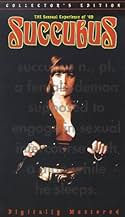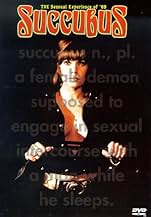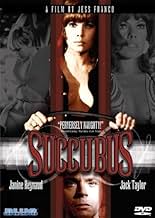CALIFICACIÓN DE IMDb
5.3/10
1.3 k
TU CALIFICACIÓN
Agrega una trama en tu idiomaA performer at an S&M nightclub begins to lose her grip on reality, and is plunged into a nightmarish mental landscape.A performer at an S&M nightclub begins to lose her grip on reality, and is plunged into a nightmarish mental landscape.A performer at an S&M nightclub begins to lose her grip on reality, and is plunged into a nightmarish mental landscape.
Howard Vernon
- Admiral Kapp
- (as Howard Varnon)
Jesús Franco
- Writer
- (sin créditos)
Karl Heinz Mannchen
- Partyguest
- (sin créditos)
Daniel White
- Piano Player
- (sin créditos)
- Dirección
- Guionista
- Todo el elenco y el equipo
- Producción, taquilla y más en IMDbPro
Argumento
¿Sabías que…?
- TriviaFritz Lang once called it the greatest erotic thriller he'd ever seen.
- ConexionesFeatured in Eurotika!: The Diabolical Mr. Franco (1999)
Opinión destacada
After making several "normal" horror/exploitation films, Franco indulged in this baffling but engaging fever-dream of supernatural fantasy. Around this time, Franco, like his French counterpart Jean Rollin, began an arty phase, weaving haunting scenes of surrealism, eroticism, and horror into enigmatic, loosely constructed stories.
Both directors were notorious for writing scripts a few hours before shooting or starting a film without a script based on a dream, trusting improvisation and inspiration to furnish the rest of the story. The difference is that Rollin usually discovered some logical explanation along the way for all the weird goings on, while Franco's work remains ambiguous.
Our story begins with the beautiful redhead Lorna (Janine Reynaud) as a dominatrix in an avant-garde S&M nightclub act for jaded sophisticates. She is the symbol of dangerous seduction and the obsession of men and women alike. Her Mephistophelean manager (Jack Taylor) has somehow transformed her into "the essence of evil - a devil on earth", but how and why is left unexplained. There are long, lyrical dream sequences (nicely shot in soft, hazy tones) where she repeatedly returns to a Gothic castle by the sea. Roaming through the elegant rooms, she has memories of a past life as a countess. (Her thoughts, like the thoughts of most of the characters, are related via narration.) In a highly effective scene, a room full of mannequins dressed in period gowns become animated and threatening.
As fantasy and reality blend together, there are many strange encounters, tastefully restrained nude scenes (unusual for Franco), a few murders that may be hallucinations, and a decadent party straight out of "La Dolce Vita". In fact, Franco seems to be under the spell of Fellini (especially "Juliet of the Spirits") for much of the film.
As the story shifts from Portugal to Berlin, there are some nice scenes of the austere German city and creative shots (reflections in a car window, ducks on a pond) accompanied by poetic and philosophical musings. Clearly, there is some kind of artistic intent here despite a flawed and confusing narrative. A profusion of random ideas and beautiful/bizarre images pop up like wildflowers all over this crazy dreamscape but offer no explanation. Like many David Lynch films, the story is a head-scratcher, but there is enough stylish and visually rewarding material to make it worth seeing.
Both directors were notorious for writing scripts a few hours before shooting or starting a film without a script based on a dream, trusting improvisation and inspiration to furnish the rest of the story. The difference is that Rollin usually discovered some logical explanation along the way for all the weird goings on, while Franco's work remains ambiguous.
Our story begins with the beautiful redhead Lorna (Janine Reynaud) as a dominatrix in an avant-garde S&M nightclub act for jaded sophisticates. She is the symbol of dangerous seduction and the obsession of men and women alike. Her Mephistophelean manager (Jack Taylor) has somehow transformed her into "the essence of evil - a devil on earth", but how and why is left unexplained. There are long, lyrical dream sequences (nicely shot in soft, hazy tones) where she repeatedly returns to a Gothic castle by the sea. Roaming through the elegant rooms, she has memories of a past life as a countess. (Her thoughts, like the thoughts of most of the characters, are related via narration.) In a highly effective scene, a room full of mannequins dressed in period gowns become animated and threatening.
As fantasy and reality blend together, there are many strange encounters, tastefully restrained nude scenes (unusual for Franco), a few murders that may be hallucinations, and a decadent party straight out of "La Dolce Vita". In fact, Franco seems to be under the spell of Fellini (especially "Juliet of the Spirits") for much of the film.
As the story shifts from Portugal to Berlin, there are some nice scenes of the austere German city and creative shots (reflections in a car window, ducks on a pond) accompanied by poetic and philosophical musings. Clearly, there is some kind of artistic intent here despite a flawed and confusing narrative. A profusion of random ideas and beautiful/bizarre images pop up like wildflowers all over this crazy dreamscape but offer no explanation. Like many David Lynch films, the story is a head-scratcher, but there is enough stylish and visually rewarding material to make it worth seeing.
- jivers01
- 11 abr 2013
- Enlace permanente
Selecciones populares
Inicia sesión para calificar y agrega a la lista de videos para obtener recomendaciones personalizadas
- How long is Succubus?Con tecnología de Alexa
Detalles
- Tiempo de ejecución1 hora 24 minutos
- Mezcla de sonido
- Relación de aspecto
- 1.66 : 1
Contribuir a esta página
Sugiere una edición o agrega el contenido que falta

Principales brechas de datos
By what name was La mujer que deseó el diablo (1968) officially released in Canada in English?
Responda














